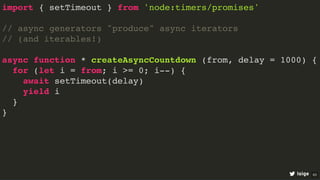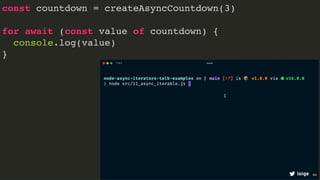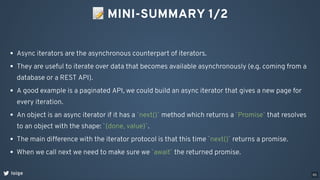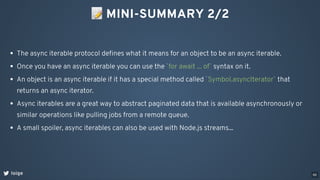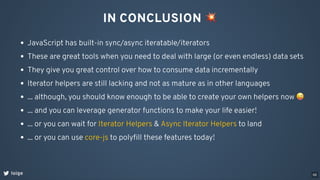The document contains code snippets in various programming languages to calculate a total from a list of financial transactions, indicating whether the user is financially sound or not. Each snippet processes a series of 'paid' and 'received' transactions, adjusting the total accordingly and outputting messages based on the resulting balance. Additionally, it touches on the concept of lazy iterators and the utility of iterators in efficiently handling data streams.


![String[] transactions = {
"paid 20",
"received 10",
"paid 5",
"received 15",
"paid 10",
"received 12"
};
var total = Stream.of(transactions).mapToInt(transaction -> {
var parts = transaction.split(" ");
int amount = Integer.decode(parts[1]);
if (Objects.equals(parts[0], "paid")) {
amount = -amount;
}
return amount;
}).sum();
if (total >= 0) {
System.out.println("Life is good :)");
} else {
System.out.println("You are broke :(");
}
1
2
3
4
5
6
7
8
9
10
11
12
13
14
15
16
17
18
19
20
21
22
23
24
loige
replit.com/@lmammino/r-u-broke-java
3](https://image.slidesharecdn.com/did-you-know-javascript-has-iterators-dublinjs-230308083442-ee323ad8/85/Did-you-know-JavaScript-has-iterators-DublinJS-3-320.jpg)
![String[] transactions = {
"paid 20",
"received 10",
"paid 5",
"received 15",
"paid 10",
"received 12"
};
1
2
3
4
5
6
7
8
9
var total = Stream.of(transactions).mapToInt(transaction -> {
10
var parts = transaction.split(" ");
11
int amount = Integer.decode(parts[1]);
12
if (Objects.equals(parts[0], "paid")) {
13
amount = -amount;
14
}
15
16
return amount;
17
}).sum();
18
19
if (total >= 0) {
20
System.out.println("Life is good :)");
21
} else {
22
System.out.println("You are broke :(");
23
}
24
var total = Stream.of(transactions).mapToInt(transaction -> {
String[] transactions = {
1
"paid 20",
2
"received 10",
3
"paid 5",
4
"received 15",
5
"paid 10",
6
"received 12"
7
};
8
9
10
var parts = transaction.split(" ");
11
int amount = Integer.decode(parts[1]);
12
if (Objects.equals(parts[0], "paid")) {
13
amount = -amount;
14
}
15
16
return amount;
17
}).sum();
18
19
if (total >= 0) {
20
System.out.println("Life is good :)");
21
} else {
22
System.out.println("You are broke :(");
23
}
24
var parts = transaction.split(" ");
int amount = Integer.decode(parts[1]);
if (Objects.equals(parts[0], "paid")) {
amount = -amount;
}
return amount;
String[] transactions = {
1
"paid 20",
2
"received 10",
3
"paid 5",
4
"received 15",
5
"paid 10",
6
"received 12"
7
};
8
9
var total = Stream.of(transactions).mapToInt(transaction -> {
10
11
12
13
14
15
16
17
}).sum();
18
19
if (total >= 0) {
20
System.out.println("Life is good :)");
21
} else {
22
System.out.println("You are broke :(");
23
}
24
}).sum();
String[] transactions = {
1
"paid 20",
2
"received 10",
3
"paid 5",
4
"received 15",
5
"paid 10",
6
"received 12"
7
};
8
9
var total = Stream.of(transactions).mapToInt(transaction -> {
10
var parts = transaction.split(" ");
11
int amount = Integer.decode(parts[1]);
12
if (Objects.equals(parts[0], "paid")) {
13
amount = -amount;
14
}
15
16
return amount;
17
18
19
if (total >= 0) {
20
System.out.println("Life is good :)");
21
} else {
22
System.out.println("You are broke :(");
23
}
24
if (total >= 0) {
System.out.println("Life is good :)");
} else {
System.out.println("You are broke :(");
}
String[] transactions = {
1
"paid 20",
2
"received 10",
3
"paid 5",
4
"received 15",
5
"paid 10",
6
"received 12"
7
};
8
9
var total = Stream.of(transactions).mapToInt(transaction -> {
10
var parts = transaction.split(" ");
11
int amount = Integer.decode(parts[1]);
12
if (Objects.equals(parts[0], "paid")) {
13
amount = -amount;
14
}
15
16
return amount;
17
}).sum();
18
19
20
21
22
23
24
String[] transactions = {
"paid 20",
"received 10",
"paid 5",
"received 15",
"paid 10",
"received 12"
};
var total = Stream.of(transactions).mapToInt(transaction -> {
var parts = transaction.split(" ");
int amount = Integer.decode(parts[1]);
if (Objects.equals(parts[0], "paid")) {
amount = -amount;
}
return amount;
}).sum();
if (total >= 0) {
System.out.println("Life is good :)");
} else {
System.out.println("You are broke :(");
}
1
2
3
4
5
6
7
8
9
10
11
12
13
14
15
16
17
18
19
20
21
22
23
24
loige
replit.com/@lmammino/r-u-broke-java
4](https://image.slidesharecdn.com/did-you-know-javascript-has-iterators-dublinjs-230308083442-ee323ad8/85/Did-you-know-JavaScript-has-iterators-DublinJS-4-320.jpg)
![transactions = [
"paid 20",
"received 10",
"paid 5",
"received 15",
"paid 10",
"received 12"
];
def get_amount(transaction):
type, amount = transaction.split(' ')
amount = int(amount)
if type == 'paid':
return -amount
return amount
*_, total = accumulate(
map(get_amount, transactions)
)
if total >= 0:
print("Life is good :)")
else:
print("You are broke :(")
1
2
3
4
5
6
7
8
9
10
11
12
13
14
15
16
17
18
19
20
21
22
23
24
loige
replit.com/@lmammino/r-u-broke-py
5](https://image.slidesharecdn.com/did-you-know-javascript-has-iterators-dublinjs-230308083442-ee323ad8/85/Did-you-know-JavaScript-has-iterators-DublinJS-5-320.jpg)
![let transactions = [
"paid 20",
"received 10",
"paid 5",
"received 15",
"paid 10",
"received 12",
];
let total: i32 = transactions
.iter()
.map(|transaction| {
let (action, amount) = transaction.split_once(' ').unwrap();
let amount = amount.parse::<i32>().unwrap();
if action == "paid" {
-amount
} else {
amount
}
})
.sum();
if total >= 0 {
println!("Life is good :)");
} else {
println!("You are broke :(");
}
1
2
3
4
5
6
7
8
9
10
11
12
13
14
15
16
17
18
19
20
21
22
23
24
25
26
27
loige
replit.com/@lmammino/r-u-broke-rust
6](https://image.slidesharecdn.com/did-you-know-javascript-has-iterators-dublinjs-230308083442-ee323ad8/85/Did-you-know-JavaScript-has-iterators-DublinJS-6-320.jpg)
![const transactions = [
"paid 20",
"received 10",
"paid 5",
"received 15",
"paid 10",
"received 12"
]
const total = Iterator.from(transactions)
.map(transaction => {
let [action, amount] = transaction.split(" ")
amount = Number.parseInt(amount)
if (action === "paid") {
return -amount
} else {
return amount
}
})
.reduce((acc,curr) => acc + curr)
if (total >= 0) {
console.log("Life is good :)")
} else {
console.log("You are broke :(");
}
1
2
3
4
5
6
7
8
9
10
11
12
13
14
15
16
17
18
19
20
21
22
23
24
25
26
loige
replit.com/@lmammino/r-u-broke-js
7](https://image.slidesharecdn.com/did-you-know-javascript-has-iterators-dublinjs-230308083442-ee323ad8/85/Did-you-know-JavaScript-has-iterators-DublinJS-7-320.jpg)
![const transactions = [
"paid 20",
"received 10",
"paid 5",
"received 15",
"paid 10",
"received 12"
]
const total = Iterator.from(transactions)
.map(transaction => {
let [action, amount] = transaction.split(" ")
amount = Number.parseInt(amount)
if (action === "paid") {
return -amount
} else {
return amount
}
})
.reduce((acc,curr) => acc + curr)
if (total >= 0) {
console.log("Life is good :)")
} else {
console.log("You are broke :(");
}
1
2
3
4
5
6
7
8
9
10
11
12
13
14
15
16
17
18
19
20
21
22
23
24
25
26
const total = Iterator.from(transactions)
const transactions = [
1
"paid 20",
2
"received 10",
3
"paid 5",
4
"received 15",
5
"paid 10",
6
"received 12"
7
]
8
9
10
.map(transaction => {
11
let [action, amount] = transaction.split(" ")
12
amount = Number.parseInt(amount)
13
if (action === "paid") {
14
return -amount
15
} else {
16
return amount
17
}
18
})
19
.reduce((acc,curr) => acc + curr)
20
21
if (total >= 0) {
22
console.log("Life is good :)")
23
} else {
24
console.log("You are broke :(");
25
}
26
.map(transaction => {
const transactions = [
1
"paid 20",
2
"received 10",
3
"paid 5",
4
"received 15",
5
"paid 10",
6
"received 12"
7
]
8
9
const total = Iterator.from(transactions)
10
11
let [action, amount] = transaction.split(" ")
12
amount = Number.parseInt(amount)
13
if (action === "paid") {
14
return -amount
15
} else {
16
return amount
17
}
18
})
19
.reduce((acc,curr) => acc + curr)
20
21
if (total >= 0) {
22
console.log("Life is good :)")
23
} else {
24
console.log("You are broke :(");
25
}
26
.reduce((acc,curr) => acc + curr)
const transactions = [
1
"paid 20",
2
"received 10",
3
"paid 5",
4
"received 15",
5
"paid 10",
6
"received 12"
7
]
8
9
const total = Iterator.from(transactions)
10
.map(transaction => {
11
let [action, amount] = transaction.split(" ")
12
amount = Number.parseInt(amount)
13
if (action === "paid") {
14
return -amount
15
} else {
16
return amount
17
}
18
})
19
20
21
if (total >= 0) {
22
console.log("Life is good :)")
23
} else {
24
console.log("You are broke :(");
25
}
26
const transactions = [
"paid 20",
"received 10",
"paid 5",
"received 15",
"paid 10",
"received 12"
]
const total = Iterator.from(transactions)
.map(transaction => {
let [action, amount] = transaction.split(" ")
amount = Number.parseInt(amount)
if (action === "paid") {
return -amount
} else {
return amount
}
})
.reduce((acc,curr) => acc + curr)
if (total >= 0) {
console.log("Life is good :)")
} else {
console.log("You are broke :(");
}
1
2
3
4
5
6
7
8
9
10
11
12
13
14
15
16
17
18
19
20
21
22
23
24
25
26
loige
replit.com/@lmammino/r-u-broke-js
8](https://image.slidesharecdn.com/did-you-know-javascript-has-iterators-dublinjs-230308083442-ee323ad8/85/Did-you-know-JavaScript-has-iterators-DublinJS-8-320.jpg)
![const transactions = [
"paid 20",
"received 10",
"paid 5",
"received 15",
"paid 10",
"received 12"
]
const total = Iterator.from(transactions)
.map(transaction => {
let [action, amount] = transaction.split(" ")
amount = Number.parseInt(amount)
if (action === "paid") {
return -amount
} else {
return amount
}
})
.reduce((acc,curr) => acc + curr)
if (total >= 0) {
console.log("Life is good :)")
} else {
console.log("You are broke :(");
}
1
2
3
4
5
6
7
8
9
10
11
12
13
14
15
16
17
18
19
20
21
22
23
24
25
26
loige
replit.com/@lmammino/r-u-broke-js
This is not JavaScript, it's FutureJavaScript™
github.com/tc39/proposal-iterator-helpers
9](https://image.slidesharecdn.com/did-you-know-javascript-has-iterators-dublinjs-230308083442-ee323ad8/85/Did-you-know-JavaScript-has-iterators-DublinJS-9-320.jpg)
![import Iterator from 'core-js-pure/actual/iterator/index.js'
1
2
const transactions = [
3
"paid 20",
4
"received 10",
5
"paid 5",
6
"received 15",
7
"paid 10",
8
"received 12"
9
]
10
11
const total = Iterator.from(transactions)
12
.map(transaction => {
13
let [action, amount] = transaction.split(" ")
14
amount = Number.parseInt(amount)
15
if (action === "paid") {
16
return -amount
17
} else {
18
return amount
19
}
20
})
21
.reduce((acc,curr) => acc + curr)
22
23
if (total >= 0) {
24
console.log("Life is good :)")
25
} else {
26
console.log("You are broke :(");
27 loige
But if you want the future, today...
npm i --save core-js-pure
10](https://image.slidesharecdn.com/did-you-know-javascript-has-iterators-dublinjs-230308083442-ee323ad8/85/Did-you-know-JavaScript-has-iterators-DublinJS-10-320.jpg)

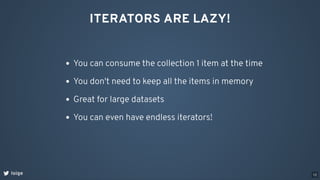





![const array = ['foo', 'bar', 'baz']
for (const item of array) {
console.log(item)
}
loige
Output:
foo
bar
baz
18](https://image.slidesharecdn.com/did-you-know-javascript-has-iterators-dublinjs-230308083442-ee323ad8/85/Did-you-know-JavaScript-has-iterators-DublinJS-18-320.jpg)
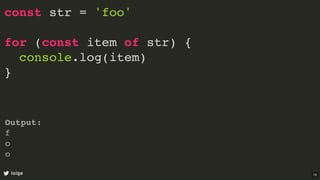
![const set = new Set(['foo', 'bar', 'baz'])
for (const item of set) {
console.log(item)
}
loige
Output:
foo
bar
baz
20](https://image.slidesharecdn.com/did-you-know-javascript-has-iterators-dublinjs-230308083442-ee323ad8/85/Did-you-know-JavaScript-has-iterators-DublinJS-20-320.jpg)
![const map = new Map([
['foo', 'bar'], ['baz', 'qux']
])
for (const item of map) {
console.log(item)
}
loige
Output:
[ 'foo', 'bar' ]
[ 'baz', 'qux' ]
21](https://image.slidesharecdn.com/did-you-know-javascript-has-iterators-dublinjs-230308083442-ee323ad8/85/Did-you-know-JavaScript-has-iterators-DublinJS-21-320.jpg)
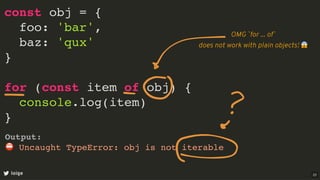
![const obj = {
foo: 'bar',
baz: 'qux'
}
for (const item of Object.entries(obj)) {
console.log(item)
}
loige
Output:
[ 'foo', 'bar' ]
[ 'baz', 'qux' ]
23](https://image.slidesharecdn.com/did-you-know-javascript-has-iterators-dublinjs-230308083442-ee323ad8/85/Did-you-know-JavaScript-has-iterators-DublinJS-23-320.jpg)
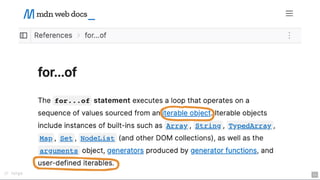
![const array = ['foo', 'bar', 'baz']
console.log(...array)
loige
Output:
foo bar baz
spread syntax!
25](https://image.slidesharecdn.com/did-you-know-javascript-has-iterators-dublinjs-230308083442-ee323ad8/85/Did-you-know-JavaScript-has-iterators-DublinJS-25-320.jpg)
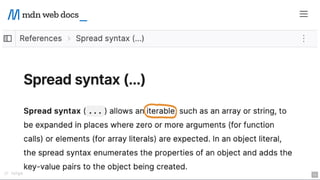
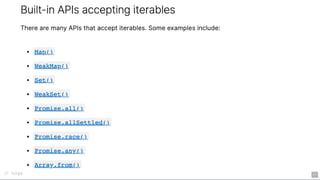


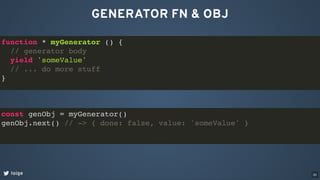
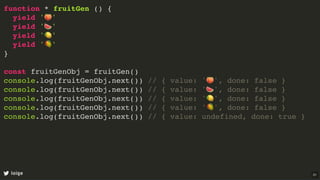
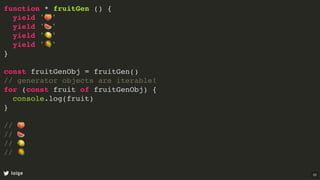
![function * range (start, end) {
for (let i = start; i < end; i++) {
yield i
}
}
// generators are lazy!
for (const i of range(0, Number.MAX_VALUE)) {
console.log(i)
}
const zeroToTen = [...range(0, 11)]
loige 33](https://image.slidesharecdn.com/did-you-know-javascript-has-iterators-dublinjs-230308083442-ee323ad8/85/Did-you-know-JavaScript-has-iterators-DublinJS-33-320.jpg)
![// generators can be "endless"
function * cycle (values) {
let current = 0
while (true) {
yield values[current]
current = (current + 1) % values.length
}
}
for (const value of cycle(['even', 'odd'])) {
console.log(value)
}
// even
// odd
// even
// ...
loige 34](https://image.slidesharecdn.com/did-you-know-javascript-has-iterators-dublinjs-230308083442-ee323ad8/85/Did-you-know-JavaScript-has-iterators-DublinJS-34-320.jpg)


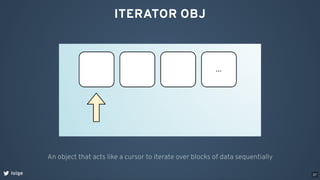
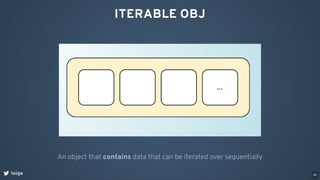

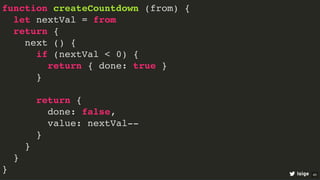
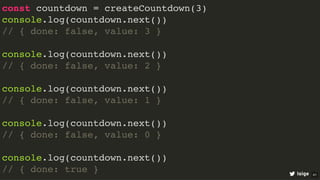

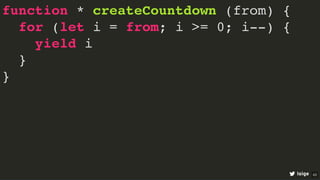
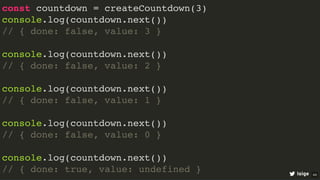
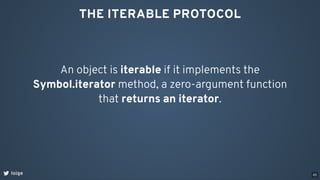
![function createCountdown (from) {
let nextVal = from
return {
[Symbol.iterator]: () => ({
next () {
if (nextVal < 0) {
return { done: true }
}
return { done: false, value: nextVal-- }
}
})
}
}
loige 46](https://image.slidesharecdn.com/did-you-know-javascript-has-iterators-dublinjs-230308083442-ee323ad8/85/Did-you-know-JavaScript-has-iterators-DublinJS-46-320.jpg)
![function createCountdown (from) {
return {
[Symbol.iterator]: function * () {
for (let i = from; i >= 0; i--) {
yield i
}
}
}
}
loige 47](https://image.slidesharecdn.com/did-you-know-javascript-has-iterators-dublinjs-230308083442-ee323ad8/85/Did-you-know-JavaScript-has-iterators-DublinJS-47-320.jpg)
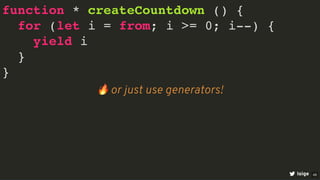
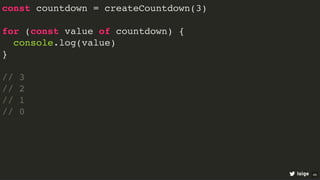
![const iterableIterator = {
next () {
return { done: false, value: 'hello' }
},
[Symbol.iterator] () {
return this
}
}
An object can be an iterable and an iterator at the same time!
loige 50](https://image.slidesharecdn.com/did-you-know-javascript-has-iterators-dublinjs-230308083442-ee323ad8/85/Did-you-know-JavaScript-has-iterators-DublinJS-50-320.jpg)
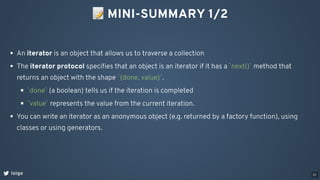
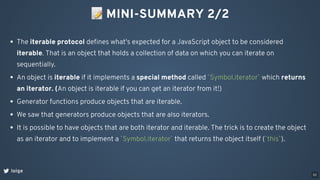


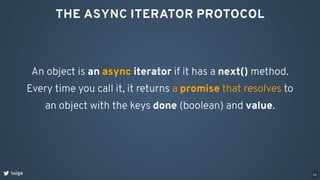
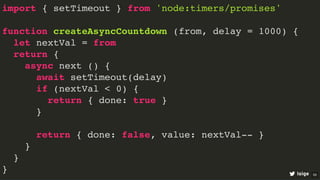
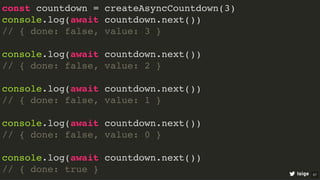
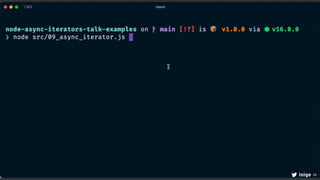
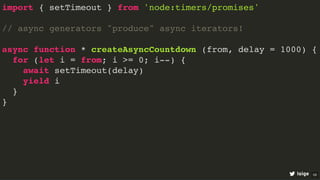
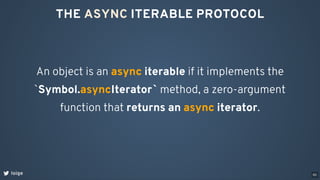
![import { setTimeout } from 'node:timers/promises'
function createAsyncCountdown (from, delay = 1000) {
return {
[Symbol.asyncIterator]: async function * () {
for (let i = from; i >= 0; i--) {
await setTimeout(delay)
yield i
}
}
}
}
loige 61](https://image.slidesharecdn.com/did-you-know-javascript-has-iterators-dublinjs-230308083442-ee323ad8/85/Did-you-know-JavaScript-has-iterators-DublinJS-61-320.jpg)

